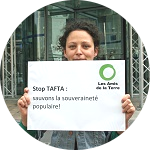Almost two years into the secret EU-US trade negotiations – also known as the Transatlantic Trade and Investment Partnership (TTIP) – and public outcry keeps growing by the day, with a citizens’ petition against the deal currently exceeding one million signatures.
Perhaps one of the most controversial aspects of TTIP concerns the inclusion of the so-called investor-state dispute settlement (ISDS) mechanism.
ISDS grants foreign investors special rights through trade treaties, which allow corporations to sue governments in secret private tribunals when new laws get in the way of their expected profits.
This dangerous clause has already allowed corporations to challenge public interest measures such as fracking moratoria, bans on toxic chemicals and, recently, Germany’s democratic decision to phase out nuclear power.
Supporters of private arbitration argue that it is a standard clause, which already exists in more than 3,000 trade agreements worldwide.
However, they rarely mention two relevant parameters likely to make us think twice before promoting ISDS in the recently concluded EU-Canada deal and the ongoing EU-US negotiations.
First of all, they omit the costs of corporate privileges on public finances and regulations.
New analysis by Friends of the Earth Europe highlights the fact that EU governments have already paid at least €3.5 billion to private investors due to ISDS in other treaties. Because the system is shrouded in secrecy, this could be only the tip of the iceberg.
While taxpayers foot the bill, it is sometimes impossible to know where the arbitration took place, how much was claimed, who the arbitrators were or even what the exact case outcome was.
In any case, what is visible gives reason for concern. For instance, Eastern European countries, the Czech Republic in particular, have been hit the hardest – 76 per cent of the 127 known cases.
Even when changing their regulations in order to comply with EU law in their accession process!
Also, some 60 per cent of all the cases relate to environmentally relevant sectors. Contrary to what the European Commission says, this mechanism can have a chilling effect on regulation, even when the parties settle.
While settlements are presented as a positive outcome, Poland had to pay €2billion to Dutch insurance company Eureko and the city of Hamburg lowered environmental standards following a suit by energy giant Vattenfall.
Second, while the reforms announced by the European Commission will not fix the fundamental flaws of the system, the EU-Canada and the EU-US deals risk dramatically expanding the scope of private arbitration.
So far, the main reason why Western European countries have rarely been sued is because they have not signed trade treaties with high capital-exporting countries that included ISDS.
This is set to change if the EU-Canada deal gets ratified and the EU-US deal goes ahead.
VIP treatment for investors at the expense of protections for people and the environment is just one of the many dangers of those reckless trade deals. Over one million people across Europe have already rejected them, and it is urgent for the European Commission to listen.









